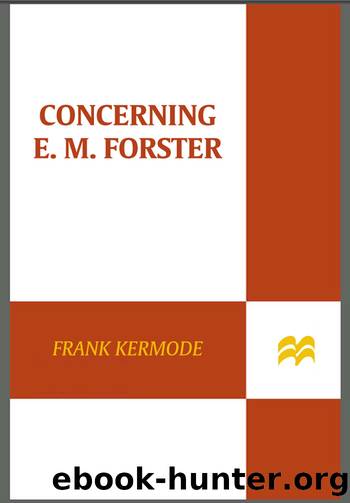Concerning E. M. Forster by Frank Kermode

Author:Frank Kermode
Language: eng
Format: epub
Publisher: Farrar, Straus and Giroux
Howards End is still admired and still preferred by some critics to A Passage to India. Here I sympathize with Samuel Hynes, who was once of that opinion but later withdrew it, expressing some astonishment that he could ever have held it. Returning to it after a long absence, the reader may well be struck by features that distinguish it quite boldly from much contemporary fiction. It says a great deal about England, its landscapes and its roads (associated with the Wilcoxâs car and so doubly deplored), and â necessarily, given the story â it considers rather than adopts political positions. Margaret Schlegel can admit the existence of âthe abyssâ of poverty at the level of destitution, and she can admit that six-hundred-pounds-a-year people have six-hundred-pounds-a-year thoughts. Wilcox can feel sure that his kind always have their hands on the ropes (a much-repeated trope, less obtrusive though also less pointed than the wisps of hay, the hay fever, and so on). More interesting is the debate in Chapter 15, the topic being âHow ought I to dispose of my money?â Although the characters admit that something must be done for the Basts of society, they believe it necessary to remember that âthe second generation had the right to profit by the self-denial of the firstâ. Some of them say the Basts will, after all, have the National Gallery, free libraries and tennis courts, only not money; others that only large sums of money can make a difference to the Bastian individual, it being for such a person âthe second most important thing in the worldâ. Would a Bast with money lose his soul? The discussion is comic but serious notions intrude. A small amount of money might pauperize the recipient, a large amount wouldnât. âMoneyâs educational . . . [if not] distributed among the many in little driblets.â And so on. Only Mrs Wilcox, now dead, had the naive imaginative power or âthe more inward lightâ to understand possessions.
This is all lightly done, ironically uncommitted; though now and again one finds a straightforward political statement: âI hope that for women . . . ânot to workâ will soon become as shocking as ânot to be marriedâ was a hundred years ago.â When there is occasion to philosophize or moralize without irony or farce, the work of explanation is done by the author (âIt is rather a moment when the commentator should step forward,â he says, and he does so when he wants to brood over the rights and wrongs of Mrs Wilcoxâs unexpected bequest; but he has already done so many times without that excuse.) Margaret Schlegel has a wide range of inexpert opinions, but they are qualified by her other attributes â liveliness, intelligence, amusement, femininity, sobriety â and when a more stable view of the world is needed she tries to provide it. But she is fallible, and then the commentator again has to come forward. The Oxford Dictionary of Quotations lists thirty-two passages from Forster, nine of which are from Howards End.
Download
This site does not store any files on its server. We only index and link to content provided by other sites. Please contact the content providers to delete copyright contents if any and email us, we'll remove relevant links or contents immediately.
| Biographies & Memoirs | Comics & Graphic Novels |
| LGBT Studies | Literature & Fiction |
| Mystery & Thrillers | Romance |
| Science Fiction & Fantasy | Travel |
Spoiler Alert: The Hero Dies by Ausiello Michael(2738)
Insomniac City by Bill Hayes(2545)
Bossypants by Tina Fey(2523)
No Ashes in the Fire by Darnell L Moore(2328)
The Book of Joan by Lidia Yuknavitch(1893)
Lucky Jim by Kingsley Amis(1744)
In the Dream House by Carmen Maria Machado(1729)
Boy Erased by Garrard Conley(1727)
Journey to the Abyss by Harry Kessler(1635)
Invisible Women by Caroline Criado Perez;(1631)
Tranny by Laura Jane Grace(1605)
Redefining Realness by Janet Mock(1569)
Difficult Women by Roxane Gay(1529)
Tell by Major Margaret Witt(1437)
Course Correction by Ginny Gilder(1406)
You Can't Touch My Hair by Phoebe Robinson(1400)
Girlish by Lara Lillibridge(1384)
In the Darkroom by Susan Faludi(1371)
Love Wins by Debbie Cenziper(1357)
